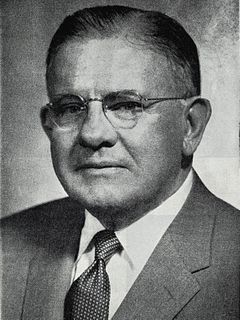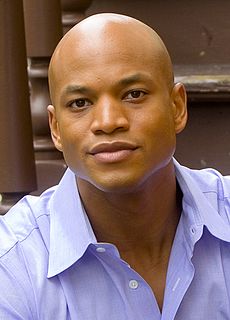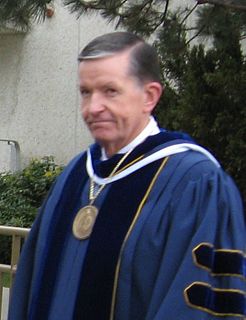A Quote by Marvin J. Ashton
The discerning realize that it is not realistic to expect perfection in others when none of us is perfect...Meaningful progress can be made only when all of us can cast the motes out of our own eyes, leave judgment to our Father in Heaven, and lose ourselves in righteous living.
Related Quotes
Our agency, given us through the plan of our Father, is the great alternative to Satan's plan of force. With this sublime gift, we can grow, improve, progress, and seek perfection. Without agency, none of us could grow and develop by learning from our mistakes and errors and those of others.... I do not really think the devil can make us do anything. Certainly he can tempt and he can deceive, but he has no authority over us that we do not give him.
Charity is not a virtue to expect in others only. It is the all-important Christian attribute to be found in ourselves. . . . We believe that charity must begin at home. Can we hope to be charitable to the stranger if love does not abound in the family? A sure step in the direction of improvement and progress in our own lives comes when we share with mother or father in their dependence as they shared with us in their productive years.... We cannot as children ignore our obligations to our parents by passing responsibility for their care to others. . . .
Before making peace, war is necessary, and that war must be made with our self. Our worst enemy is our self: our faults, our weaknesses, our limitations. And our mind is such a traitor! What does it? It covers our faults even from our own eyes, and points out to us the reason for all our difficulties: others! So it constantly deludes us, keeping us unaware of the real enemy, and pushes us towards those others to fight them, showing them to us as our enemies.
We would willingly have others perfect, and yet we amend not our own faults. We would have others severely corrected and will not be corrected ourselves. The large liberty of others displeases us, and yet we will not have our own desires denied us. We will have others kept under by strict laws, but in no sort will ourselves be restrained. And thus it appears how seldom we weigh our neighbor in the same balance with ourselves.
Do you think that we're products of our environments? I think so, or maybe products of our expectations. Others' expectations of us or our expectations. I mean others' expectations that you take on as your own. I realize how difficult it is to seperate the two. The expectations that others place on us help us form our expectations of ourselves.
God is good. He is eager to forgive. He wants us to perfect ourselves and maintain control of ourselves. He does not want Satan and others to control our lives. We must learn that keeping our Heavenly Father's commandments represents the only path to total control of ourselves, the only way to find joy, truth, and fulfillment in this life and in eternity.
To do God's will as fast as it is made known to us, to inquire hourly -- I had almost said each moment -- what He requires of us, and to leave ourselves, our friends, and every interest at His control, with a cheerful trust that the path which He marks out leads to our perfection and to Himself, -- this is at once our duty and happiness; and why will we not walk in the plain, simple way?.
Our Christian destiny is, in fact, a great one: but we cannot achieve greatness unless we lose all interest in being great. For our own idea of greatness is illusory, and if we pay too much attention to it we will be lured out of the peace and stability of the being God gave us, and seek to live in a myth we have created for ourselves. And when we are truly ourselves we lose most of the futile self-consciousness that keeps us constantly comparing ourselves with others in order to see how big we are.
When shall it be that we shall taste the sweetness of the Divine Will in all that happens to us, considering in everything only His good pleasure, by whom it is certain that adversity is sent with as much love as prosperity, and as much for our good? When shall we cast ourselves undeservedly into the arms of our most loving Father in Heaven, leaving to Him the care of ourselves and of our affairs, and reserving only the desire of pleasing Him, and of serving Him well in all that we can?
It is difficult to see ourselves as we are. Sometimes we are fortunate enough to have good friends, lovers or others who will do us the good service of telling us the truth about ourselves. When we don't, we can so easily delude ourselves, lose a sense of truth about ourselves, and our conscience loses power and purpose. Mostly, we tell ourselves what we would like to hear. We lose our way.
We see ourselves in other people’s eyes. It’s the nature of the human race; we are a species of reflection, hungry for it in every facet of our existence. Maybe that’s why vampires seem so monstrous to us—they cast no reflection. Parents, if they’re good ones, reflect the wonder of our existence and the success we can become. Friends, well chosen, show us pretty pictures of ourselves, and encourage us to grow into them. The Beast shows us the very worst in ourselves and makes us know it’s true .
Do you not think that sometimes when matters are at the worst with us, when we appear to have done all which we ourselves can do, yet all has been unavailing, and we have only shown we cannot, not we will not, help ourselves; that often just then something comes, almost as if supernaturally, to settle for us, as if our guardian angel took pity on our perplexities, and then at last obtained leave to help us? And if it be so, then what might only be a coincidence becomes a call of Providence, a voice from Heaven, a command.
Though our brother is upon the rack, as long as we ourselves are at ease, our senses will never inform us of what he suffers. They never did and never can carry us beyond our own persons, and it is by the imagination only that we form any conception of what are his sensations...His agonies, when they are thus brought home to ourselves, when we have this adopted and made them our own, begin at last to affect us, and we then tremble and shudder at the thought of what he feels.



































